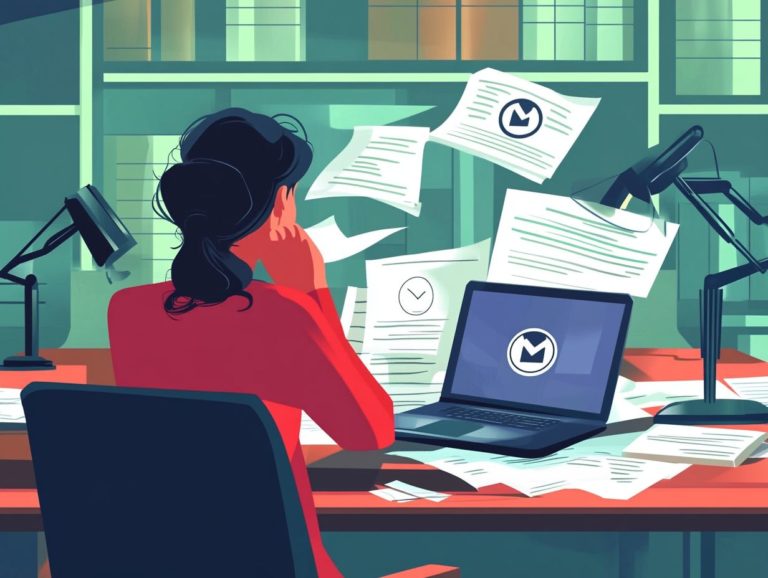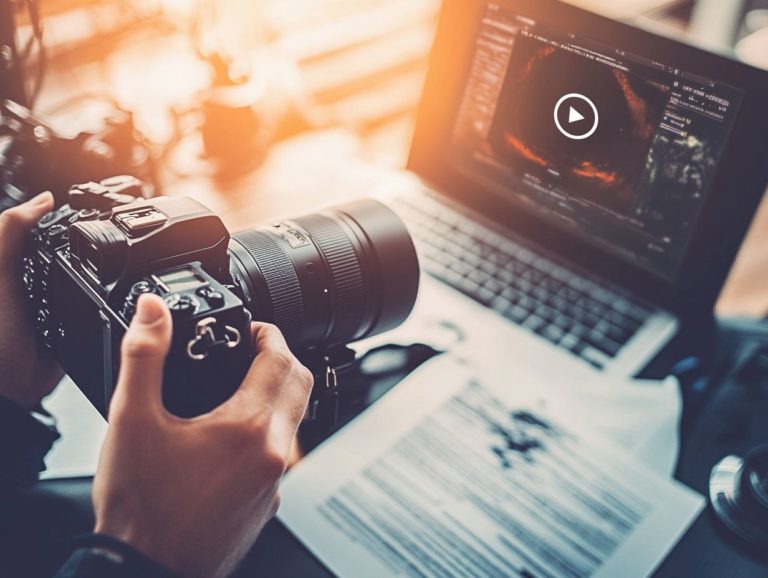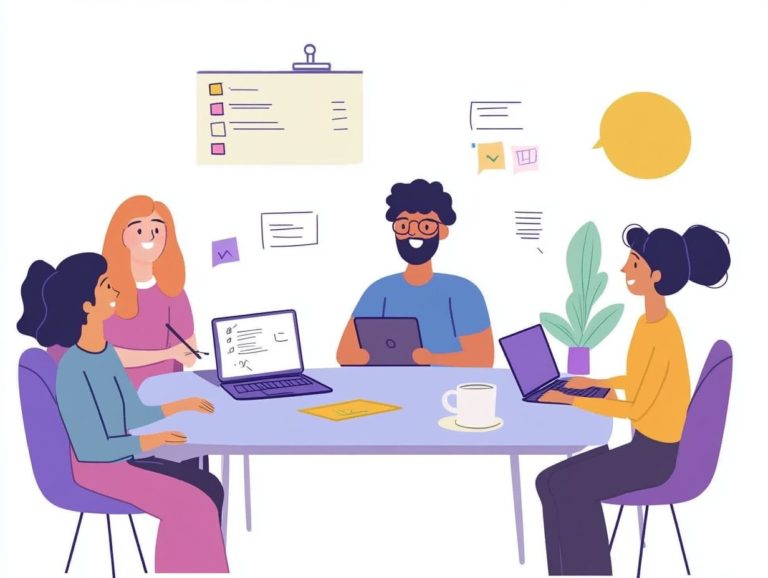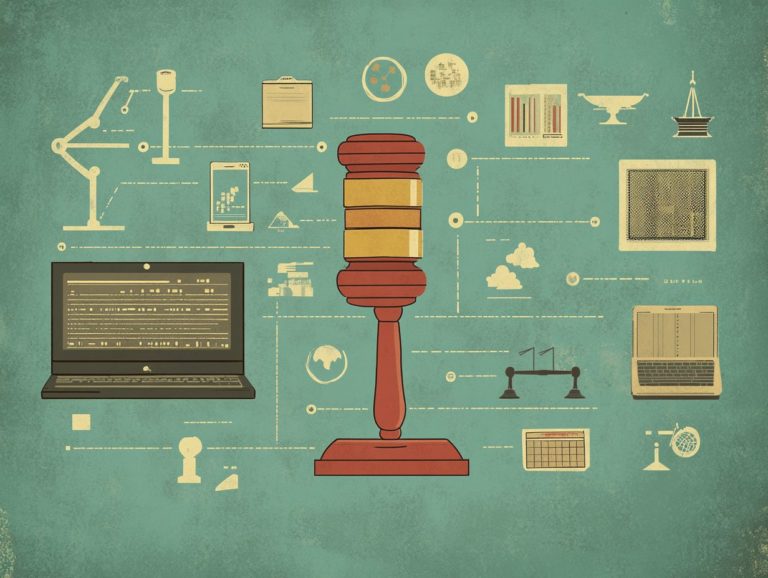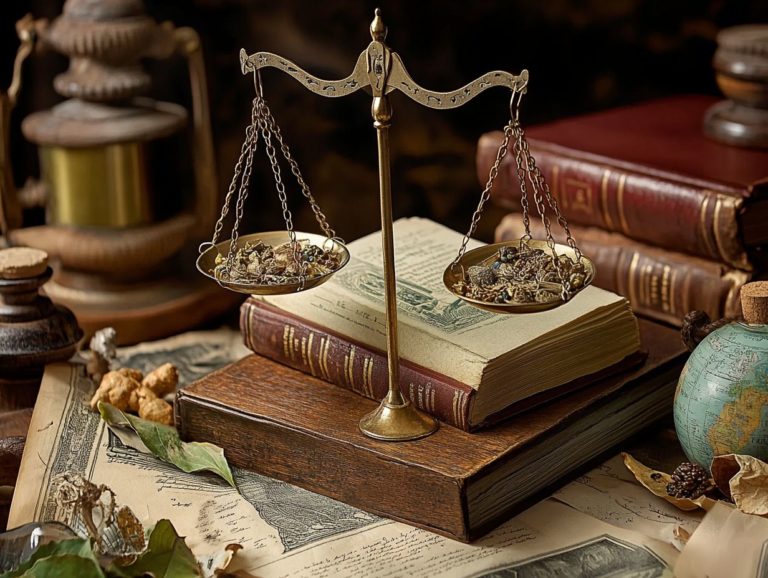5 Resources for Learning About Copyright Law
Copyright law can seem overwhelming, but it s crucial for creators and businesses alike. Let s dive in to equip you with the knowledge to defend your creative works today!
This article delves into five key resources that will illuminate your understanding of copyright spanning from official government websites to reputable educational institutions.
It also addresses crucial questions regarding what copyright law encompasses, the various types of copyright, its implications across different media, and effective strategies to safeguard your intellectual property.
Whether you re just starting out or aiming to enhance your expertise, this guide is tailored specifically for you.
Contents
- Key Takeaways:
- 1. Government Websites
- 2. Legal Databases
- 3. Law Schools and Universities
- 4. Copyright Organizations and Associations
- 5. Online Courses and Webinars
- What Is Copyright Law and Why Is It Important?
- Frequently Asked Questions
- 1. What are the top 5 resources for learning about copyright law?
- 2. Are there any free resources available for learning about copyright law?
- 3. Can I rely solely on online resources for learning about copyright law?
- 4. Are there any books or publications that can help me learn about copyright law?
- 5. How can I stay updated on changes and updates to copyright law?
- 6. Is it important for me to understand copyright law even if I am not in a creative field?
Key Takeaways:
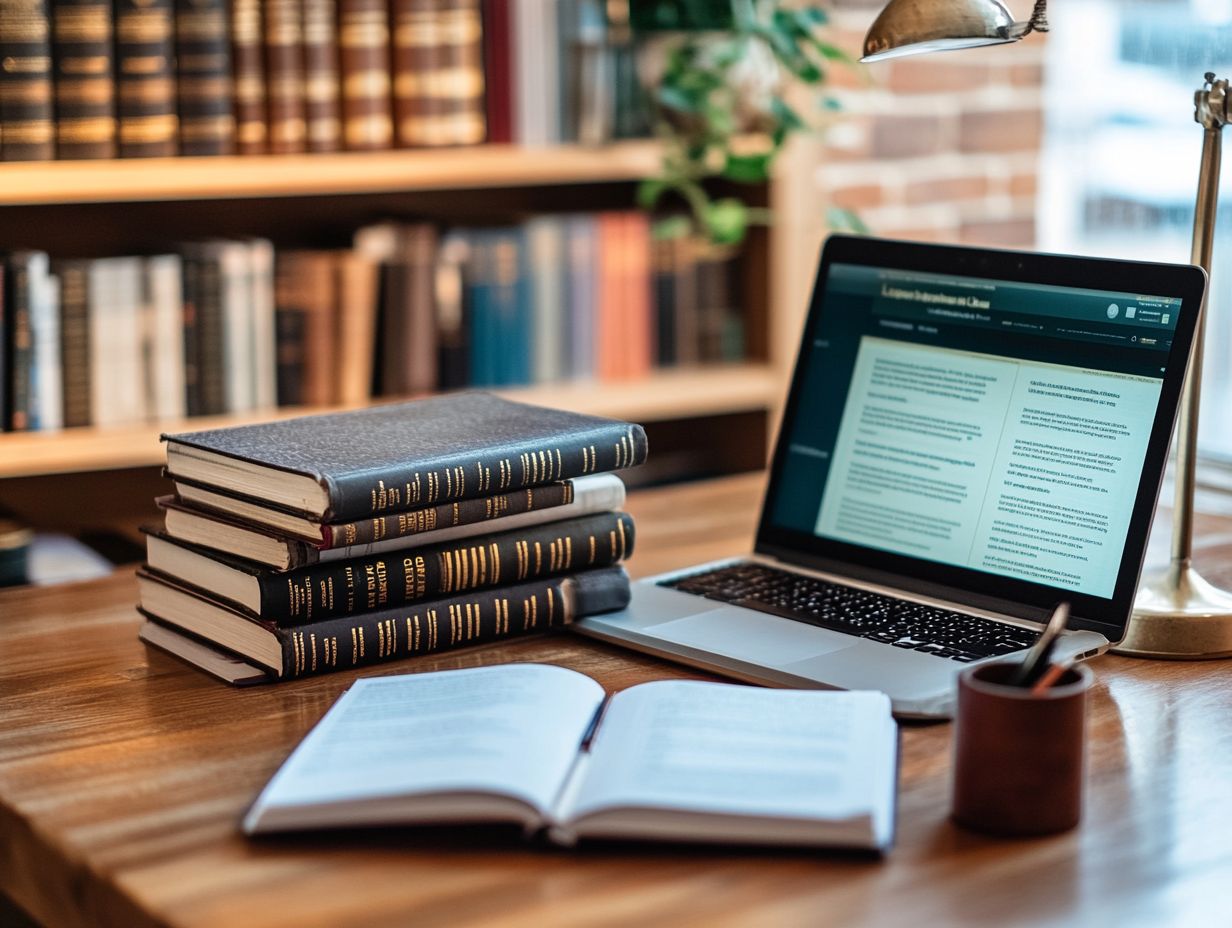
Government websites offer free and reliable information on copyright law.
Legal databases provide access to legal cases and statutes related to copyright.
Law schools and universities offer courses and workshops on copyright law.
1. Government Websites
Government websites are invaluable for understanding the details of copyright law, offering vital information and guidelines directly from the U.S. Copyright Office. This institution plays an essential role in safeguarding artistic works and original creations in the United States.
By diving into the U.S. Copyright Office s website, you can unlock a treasure trove of insights about copyright registration processes, the nuances of copyright laws, and a range of tools crafted to aid both rights owners and institutions. This resource is particularly critical for artists, authors, and musicians who are keen on protecting their intellectual property.
With detailed guides and FAQs, the registration process becomes much less daunting, all while keeping track of important deadlines and fees. The educational materials featured on the site are designed to enlighten you about fair use, or the ability to use copyrighted material under certain conditions without permission, and the boundaries of copyright protection.
For a deeper dive, you might want to explore resources like the Copyright Registration page at Copyright.gov or discover more about pertinent laws in the Legal Resources section.
Don t wait! Start exploring these government resources today to protect your creations.
2. Legal Databases
Legal databases serve as critical resources for you, whether you’re a researcher or a legal professional. They grant you access to a wealth of information on copyright law, legal usage, and cases of copyright infringement as defined in the U.S. Code.
Among the vast array of options, platforms like Westlaw and LexisNexis truly shine with their extensive libraries of legal literature and case law. These databases provide comprehensive analyses of copyright statutes, regulations, and pivotal judicial rulings, highlighting significant cases such as ‘Harper & Row v. Nation Enterprises,’ which emphasized the importance of fair use in publishing.
These resources not only deepen your understanding but also keep you informed about evolving copyright norms. You can also use databases like PACER to access federal court documents, giving you the opportunity to delve into landmark litigation and explore their implications on copyright jurisprudence.
Explore these legal databases today to elevate your knowledge and stay informed.
3. Law Schools and Universities
Law schools and universities are instrumental in shaping the next generation of legal professionals, particularly in the realm of copyright law. They provide essential resources, education, and teaching methodologies that help you grasp the intricate issues surrounding copyright and their implications across various fields.
To support this endeavor, many institutions have crafted specialized courses that dive deep into copyright theory, policy, and case law. These programs often feature practical workshops where you can immerse yourself in real-world scenarios, enhancing your critical thinking and application of copyright principles.
Moreover, partnerships with esteemed universities like Harvard and Stanford elevate the learning experience. These collaborations offer joint seminars and access to leading experts in intellectual property, providing invaluable resources such as cutting-edge legal research tools and networking opportunities.
This preparation enables you to adeptly navigate the complexities of copyright law as you embark on your future career.
Take the initiative and enroll in copyright courses at local universities to further your understanding.
4. Copyright Organizations and Associations
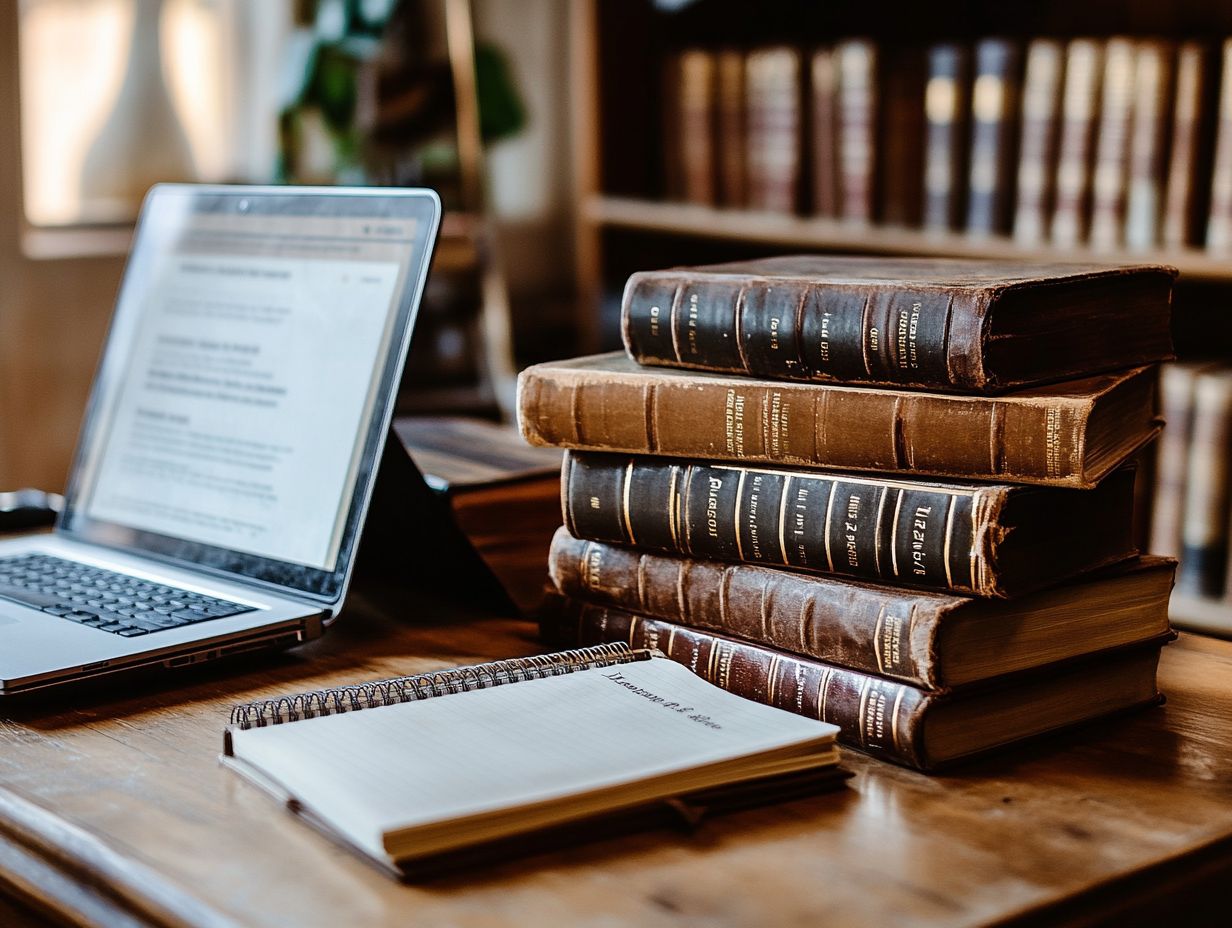
Copyright organizations and associations, like the Copyright Alliance and the American Library Association, offer invaluable guidance and support as you navigate copyright law.
These organizations are essential in educating you about your rights and responsibilities. They also advocate for necessary reforms in copyright legislation.
They provide a wealth of resources, including legal advice, educational workshops, and insightful publications that empower both creators and users.
Creative Commons is crucial in this arena, advocating for fair use principles and equipping you with tools that facilitate the sharing and distribution of creative works while safeguarding the rights of original creators.
This dedication to education and reform is vital, ensuring a balanced approach to copyright that benefits both the creative community and society as a whole.
5. Online Courses and Webinars
Online courses and webinars are invaluable educational resources for understanding copyright protection. They enable individuals and businesses to gain essential insights into online copyright issues and digital citizenship.
Platforms like Coursera, Udemy, and EdX curate various programs tailored to different audiences, from novice creators to seasoned educators.
These resources delve into the complexities of copyright law in the United States, guiding you on how to properly attribute works and understand the implications of infringement.
For creators, workshops reveal strategies to safeguard intellectual property and navigate licensing agreements. Educators will find materials specifically designed to enhance their curriculum, fostering a richer understanding among students.
Institutions also benefit, ensuring compliance and cultivating a culture of respect for copyright, which ultimately enriches the educational environment.
What Is Copyright Law and Why Is It Important?
Copyright law is a fundamental legal framework that protects your original works of authorship. It ensures that you, as a rights owner, maintain control over your creative expressions and can license your works appropriately.
This legal structure not only safeguards your artistic and literary creations but also allows you to reap financial rewards from your efforts, reinforcing the value of intellectual property.
Established in the U.S. Constitution in the late 18th century, copyright law has evolved significantly through landmark cases like “Sony Corp. v. Universal City Studios” and “Campbell v. Acuff-Rose Music, Inc.” These cases highlight the delicate balance between protection and public access.
By clearly defining your rights to reproduction, adaptation, and distribution, copyright law enables you as an artist, author, or innovator. It equips you with the necessary tools to defend your rights and thrive in a competitive landscape.
What Are the Different Types of Copyright?
Copyright encompasses several types designed to protect various artistic works, including joint authorship scenarios and the requirement for a work to be fixed in a tangible medium to qualify for protection under current copyright law.
Copyright law distinctly categorizes works, such as:
- Literary creations that cover everything from books to articles;
- Musical compositions, which include both the music itself and its recordings;
- Visual arts, embracing everything from paintings to sculptures and photographs.
Each of these categories comes with its own set of regulations and protections, ensuring that creators retain their rights.
The importance of joint authorship should not be overlooked. Joint authorship means that multiple people contribute significantly to a single work. This aspect becomes essential when navigating issues of ownership and royalties, emphasizing how fixed forms like written scripts or recorded music are crucial in establishing eligibility for copyright protection.
What Are the Basic Principles of Copyright Law?
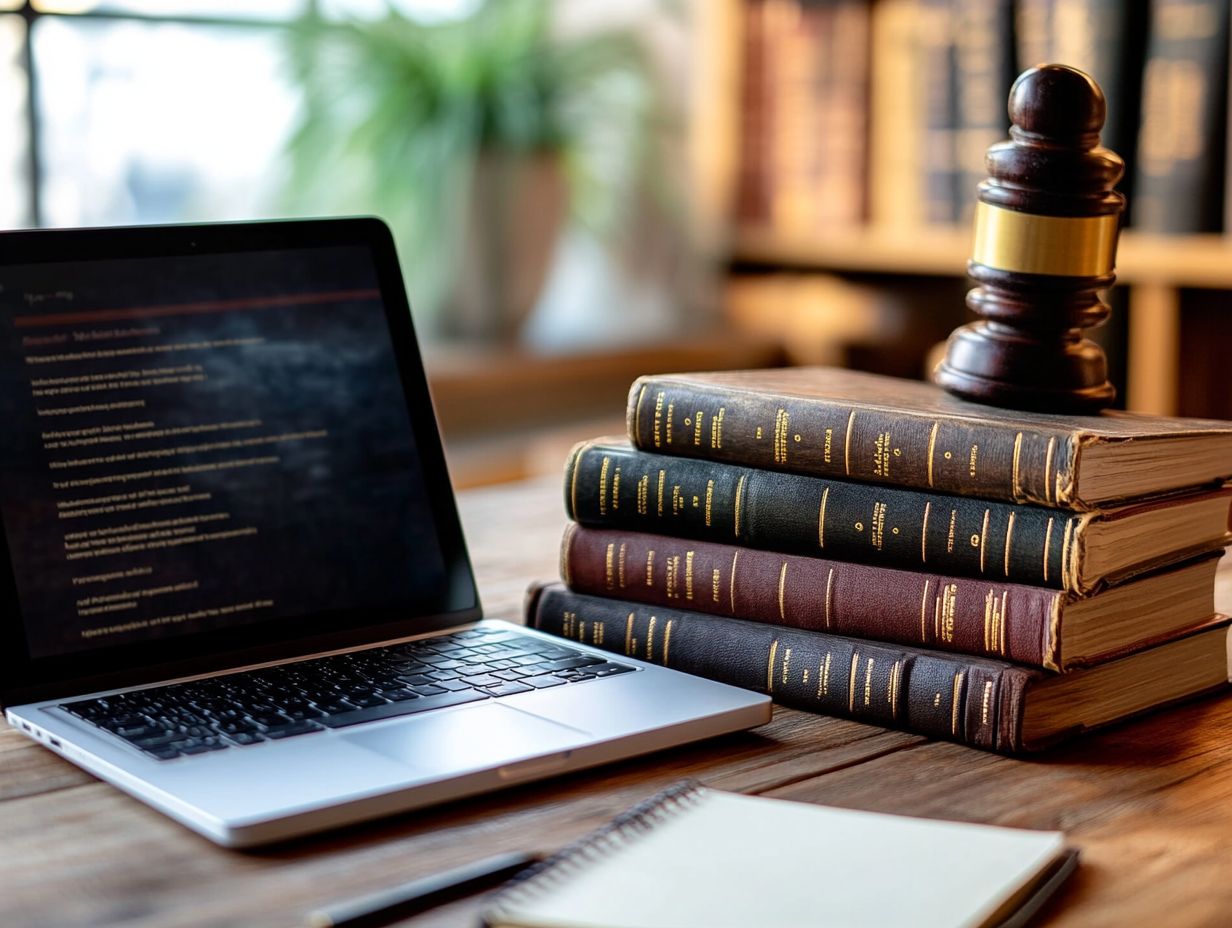
Understanding the basic principles of copyright law is essential for you. It encompasses concepts like fair use, copyright infringement (using someone else’s work without permission), and the critical distinction between legitimate usage and plagiarism. These concepts are foundational for grasping how copyright operates in real life.
The principles aim to balance the rights of creators to protect their original works and allow society to benefit from sharing and transformative use.
For example, as an educator, you can use short excerpts from a book in your classroom, illustrating how fair use supports educational purposes without infringing on the author’s rights.
On the flip side, if someone were to reproduce an entire film for profit without permission, that would clearly fall under copyright infringement, and the potential legal repercussions could be quite severe.
Navigating these laws is crucial not only for creators but also for you as a user who wants to engage with content responsibly.
How Does Copyright Law Apply to Different Forms of Media?
Copyright law presents a varied landscape across different media forms, from traditional artistic works to the ever-evolving realms of digital content and new media. Understanding copyright is vital in our digital world today.
As a creator, it s crucial for you to understand not only the legal frameworks governing your works but also the distinct challenges that come with being a digital citizen.
For instance, while filmmakers might grapple with unauthorized streaming on various platforms, musicians often navigate the complexities of sampling and the reinterpretations inherent in remix culture.
The rapid rise of social media has blurred ownership lines. It is essential for you to remain informed about best practices for attribution and fair use.
Ultimately, the shifting dynamics of copyright demand a proactive strategy for protecting intellectual property, enabling you to flourish in both traditional and digital marketplaces.
What Are the Consequences of Copyright Infringement?
Copyright infringement can lead to serious legal consequences, including lawsuits and financial penalties. Ignoring copyright laws can lead to costly lawsuits and damage your reputation. Protect your creative work today!
For you, whether an individual or part of a business, the stakes are particularly high. Unauthorized use of copyrighted material could result in hefty fines and damage payments, not to mention tarnishing your reputation. It’s essential for creators to familiarize themselves with copyright laws to ensure their work is utilized respectfully and legally.
To avoid infringement, consider implementing these strategies:
- Get the right licenses.
- Use works that are in the public domain.
- Create your own original content.
High-profile cases, like the legal battles between musicians over sampling rights, serve as stark reminders of the complexities surrounding copyright protections and the necessity for vigilance in creative practices.
How Can Individuals and Businesses Protect Their Copyrights?
You can effectively safeguard your copyrights by understanding copyright ownership laws, securing rights licenses, and utilizing copyright clearance services to navigate the intricate landscape of copyright registration and enforcement.
To ensure comprehensive protection, it’s crucial for you to engage in the copyright registration process. This involves formal documentation and filing fees, which provide you with legal advantages and serve as evidence of your ownership. Maintaining meticulous records of your creative process think drafts, sketches, and correspondence can significantly strengthen your claims in the event of disputes.
Employing copyright clearance services allows you to identify the necessary permissions for using others’ work, ultimately protecting your own creations. By understanding the nuances of your rights, you can confidently defend your intellectual property, fostering an environment where your innovative efforts are not only respected but also protected.
Frequently Asked Questions
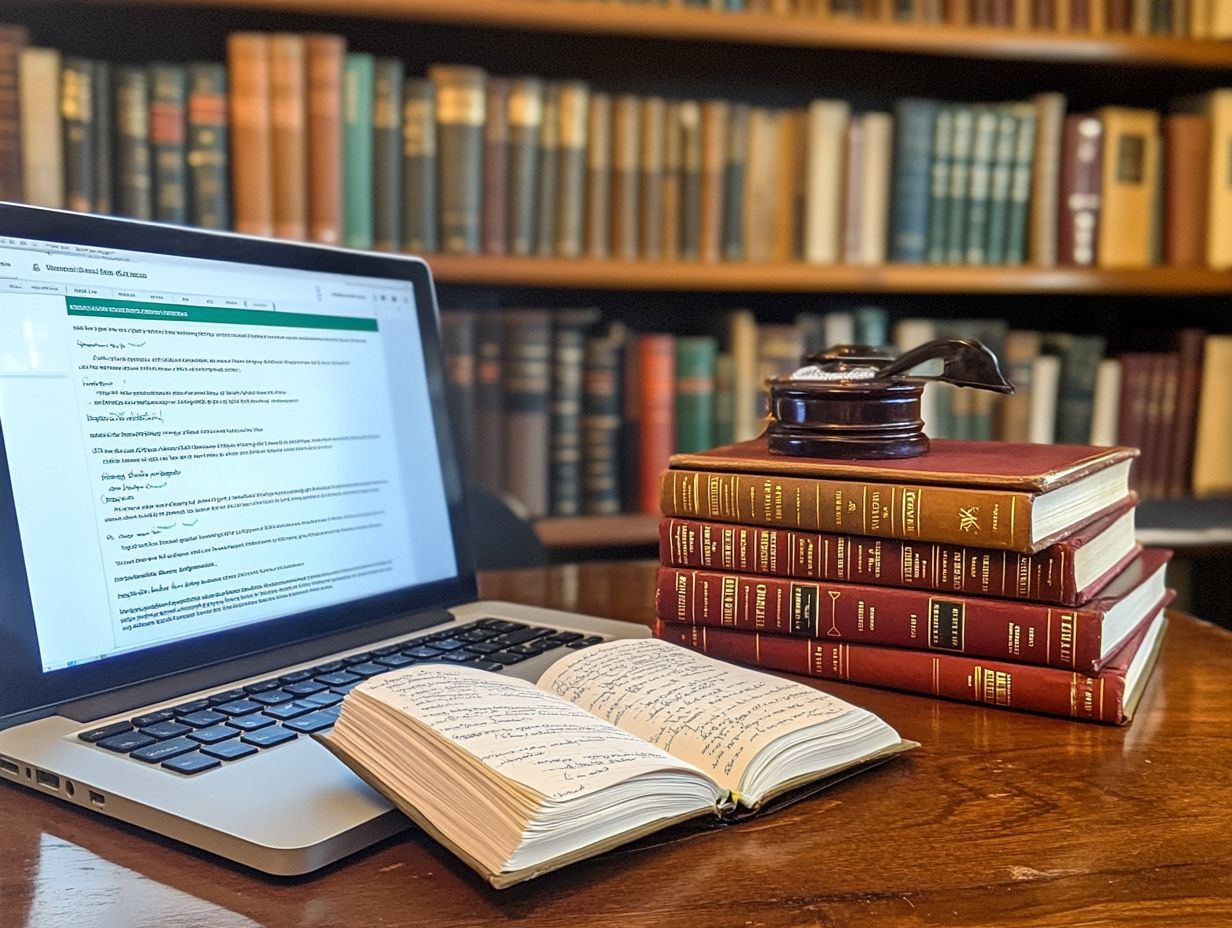
By understanding these principles and taking proactive steps, you can protect your creativity and thrive in your field.
1. What are the top 5 resources for learning about copyright law?
Here are the top five resources for learning about copyright law:
1. The United States Copyright Office website offers information on copyright laws and the registration process.
2. Copyright Alliance provides educational resources and webinars on copyright law.
3. The Stanford Copyright and Fair Use Center delivers in-depth information and analysis on copyright law in the creative industry.
4. Creative Commons offers resources and tools for understanding and using copyright licenses.
5. The Copyright Clearance Center helps with copyright compliance and licensing solutions.
2. Are there any free resources available for learning about copyright law?
Yes, many free resources are available for learning about copyright law. Here are some examples:
1. The United States Copyright Office website.
2. Creative Commons.
3. The Stanford Copyright and Fair Use Center.
4. The Digital Media Law Project.
5. The Copyright Basics page from the Copyright Clearance Center.
3. Can I rely solely on online resources for learning about copyright law?
While many valuable online resources exist, consult official government websites and seek guidance from legal professionals. Start with online resources, but don’t rely solely on them for such a complex topic.
4. Are there any books or publications that can help me learn about copyright law?
Yes, many helpful books and publications are available. Recommended titles include:
“The Copyright Handbook” by Stephen Fishman.
“Copyright Law: A Practitioner’s Guide” by Williams Strong.
“The Copyright Zone: A Legal Guide for Photographers and Artists in the Digital Age” by Edward C. Greenberg and Jack Reznicki.
5. How can I stay updated on changes and updates to copyright law?
To stay updated, regularly check official government websites like the United States Copyright Office. Follow reputable news sources that specialize in copyright law. Sign up for email newsletters or attend webinars from organizations like Copyright Alliance and Creative Commons.
6. Is it important for me to understand copyright law even if I am not in a creative field?
Yes, understanding copyright law is crucial for anyone who uses or shares digital content. This includes educators, marketers, and business owners. Knowing the basics can help you avoid legal issues and make informed decisions about using copyrighted material.

